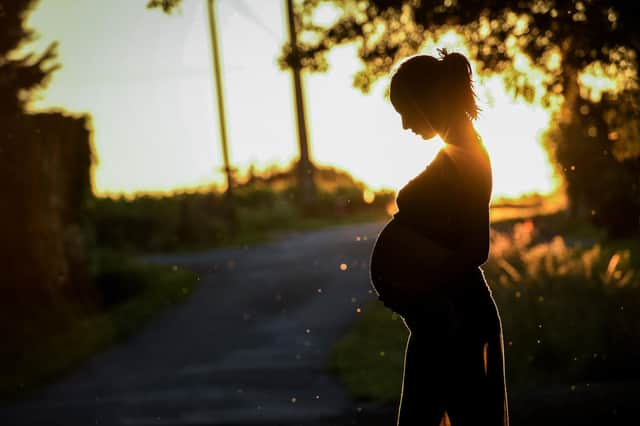Scotland's domestic violence crisis: Shocking number of attacks on pregnant women demands a change in the law – Susan Dalgety


At what should be one of the happiest times of their lives, the women will be beaten and bullied by a man, usually the father of their unborn child. Sometimes the violence will end in a miscarriage.
Yet, unlike in England and Wales, there is no specific offence of ending a pregnancy through violence or abusive behaviour in Scotland. One woman is determined to change that.
Advertisement
Hide AdAdvertisement
Hide AdNicola Murray from Perthshire is currently campaigning for 'Brodie’s Law', which would create an offence of “contributing or attempting to contribute, through violence, abusive behaviour, deception and/or coercion to the ending of a partner’s or ex-partner’s pregnancy”.
Her activism is rooted in harrowing life experience. She suffered two miscarriages after being violently assaulted by her then-partner. In 2013, her ex, Stuart Hunter, knocked her down with his car. She was six weeks pregnant and lost the baby. Hunter was convicted of reckless conduct and ordered to pay £300 compensation.
Nicola says she later lost a second child after being attacked by another partner. This time, after she had recovered from the loss of her son, whom she named Brodie, she set up a charity in his name to raise awareness about the issue and to support women who, like her, miscarried through domestic violence.
It was Nicola who earlier this week revealed the scale of the problem. Her Freedom of Information request to Police Scotland shows that, from 2017 to last year, pregnancy was “flagged” in 7,310 domestic incidents. That’s an average of 1,460 a year – four women a day.
The information came too late for Nicola’s appearance at Holyrood’s Public Petitions Committee last month, where she argued for a change in the law, but she did find cross-party support.
Labour MSP Paul Sweeney pointed out that other parts of the UK have a specific offence of “child destruction”, with a penalty of up to 15 years in prison. The SNP’s Fergus Ewing said he was “sorry” that the system had failed Nicola, and the committee convener Jackson Carlaw said consideration of the petition will continue after the summer recess with a roundtable discussion.
Following this week’s revelations, a Scottish Government spokesperson told the Daily Record that ministers had “followed the powerful evidence given to the Petitions Committee”, adding, “while the legal issues are complex, we will always give close consideration to the arguments made”.
Domestic abuse is on the rise in Scotland. Last year, Police Scotland recorded 65,252 incidents, an increase of four per cent compared to the previous year. The Scottish Government baldly noted, “this is the fifth year in a row this figure has shown an increase”.
Advertisement
Hide AdAdvertisement
Hide AdThe cost-of-living crisis that threatens us all could trigger a further increase. A study last year by Edinburgh University’s Centre for Research on Families and Relationships shows not only that pregnancy is a particular risk factor in domestic abuse cases, but so is financial insecurity.
The centre found that women on the lowest incomes are far more likely to experience abuse, but, contrary to all stereotypes, their investigation revealed that the odds of a woman being attacked increased with the level of her education.
Researchers discovered that the combination of being in the poorest household income groups and having a degree was associated with a much higher predicted prevalence of reported abuse.
“It is not clear why this might be the case,” they concluded, but I could hazard a guess. The misogyny that drives violence against women and girls is not peculiar to men on low incomes or without a degree, and women from all backgrounds are at risk of abuse. Domestic abuse is, and always has been, a problem for the whole of society. And trends suggest it is getting worse.
The latest series of Love Island is a case in point. Only this week, domestic abuse charity Women’s Aid contacted ITV about the "misogynistic and controlling behaviour" on the show and criticised the producers for not including "an understanding of controlling behaviour in relationships" in its inclusion training for contestants.
Frankly, the very premise of Love Island, where beautiful young women are reduced to sex objects desperate to “couple up” with a male contestant to stay on the show is, at best, sexist. It’s the Benny Hill Show for the Instagram generation, only far more sinister than the 1970s comedy. It glorifies misogyny and cruelty, the very roots of violence against women.
Women’s rights are fragile, in constant need of nurturing. Scottish ministers need to do more than give “close consideration” to the issues raised by Nicola Murray and others. They must act. A simple amendment to the 2018 Domestic Abuse (Scotland) Act, to include a specific offence of killing an unborn child through violence, is surely a straightforward solution.
And Scotland should have its own Domestic Violence Commissioner, just as there is in England and Wales, where Nicole Jacobs was appointed three years ago. She provides national leadership on this urgent social issue.
Advertisement
Hide AdAdvertisement
Hide AdThe Scottish Government is currently consulting on a Victim’s Commissioner but given the widespread prevalence of domestic violence – and the often-hidden nature of the crime – it requires a particular focus.
In the foreword to the consultation, Keith Brown, Cabinet Secretary for Justice, says the government “will listen to people with lived experience – victims, survivors, families…”
But listening is not enough. From today until the consultation ends on Friday, 28 pregnant women will be abused in their own homes. It’s time to act.
